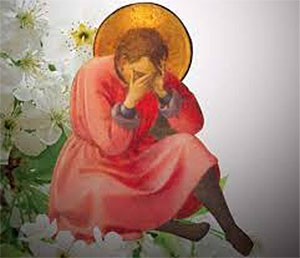Our Patron Saint - Augustine of Hippo
About Saint Augustine

Who was this saint who could make such an honest prayer as this
as a young man?
Augustine grew up in the pagan Roman society of North Africa at the turn of the fifth century. As a young man he was intelligent, ambitious and wanting to experience all that life had to offer. At the age of 17, he began living with his partner and they had a son together.
His ambition took him to Milan in Italy where he became a spin-doctor to the emperor himself, was engaged to be married into a socially well-connected family and should have been ready for his career to really take off. However, during all this time he was struggling to find the truth about himself, about God and about his church. This came to a climax one day when at his wits’ end he threw himself down in a garden in despair when he heard the voices of children at play calling, “Take and read”. He grabbed the text of Saint Paul he had been reading, opened it up and the first words his eyes fell upon were: “No drunken orgies, no promiscuity or licentiousness and no wrangling or jealousy. Put on the Lord Jesus Christ; forget about satisfying your bodies with all their cravings.”

This proved the turning point in his life. He suddenly felt strong enough to leave all his ambitions behind, to receive baptism at the age of 32 and to return to North Africa where he hoped to live quietly in a community of prayer and study.
God, however, had other plans for Augustine, and he was first ordained priest and made Bishop of Hippo, a port city in North Africa. For the next 40 years he turned his prodigious intellect to explaining the Christian faith in his sermons to his people and in his many books, the most famous, such as his ‘Confessions’ and ‘The City of God’, are still printed in Penguin Classics some 1,600 years later.
Augustine so valued friendship and community life that he wrote his ‘Rule of Life’ which he offered to groups of men and women and which he himself lived with his priests in Hippo. It is this same ‘Rule’ that members of the Order of Saint Augustine have striven to live in their communities since 1244.


